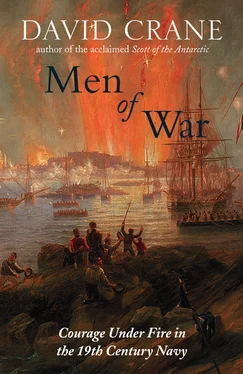Glory, revenge and the joy of battle – the brazen tripod that holds up the Homeric world – these were the urges that drove Hastings, and the Greek War was as much made for him as he was for the Greeks. Like any good Whig aristocrat he was a firm believer in Greece’s ancient liberties, yet if he fed off her classical past it was not off the Greece of Demosthenes or Aristogeiton – ‘Harry Stodgiton’ as one enthusiastic Scottish MP called him – but off an older and more elemental code. ‘That Glory is in a great measure the object I propose to myself I cannot deny,’ he would tell Lord Byron, ‘& I must acknowledge that independent of the satisfaction I should receive from establishing a European reputation … ’twould be delicious revenge to prove to those who have deprived me of my rank in the British service that the object of their persecution is not altogether devoid of Naval merit.’
There seems no way of recovering the exact steps that led Hastings to Greece – he was in France, learning the language and ‘qualifying’ himself for the kind of foreign service Cochrane had made so glamorous in South America when war broke out – but the one certainty is that without the humiliation of the Kangaroo he would never have gone. ‘My lord,’ he had written pathetically to Lord Melville, ‘only those who like me have thirsted for glory, who like me have lived in the anticipation of fame can tell how intolerable it is to find the tender bud nipped when about to bloom.’
It is arguable that Hastings never recovered from the humiliation of the Port Royal inquiry, and he certainly emerged from it a different man, less anxious to please, less open to people and in some ways less likeable than the small lad who made friends so easily in Neptune . It is possible of course that this was no more than the natural consequence of age, but between the ‘gentlemanly’ and ‘exemplary’ young officer all his captains spoke of so warmly in their testimonials and the often harsh, judgemental, self-sufficient loner who we at last get to know in Greece it is hard not to detect the shadow of the Kangaroo .
For all his sense of rejection, however, Hastings’s dismissal from the service only confirmed and strengthened in him that blinkered obsession with his profession that had never left room in his life for much else. It is clear from the early diaries of Thomas Fremantle that the brothels of Naples were a staple part of a Mediterranean officer’s world, and yet apart from a single woman’s name scrawled in a pocket notebook – and she turns out to have been a boat moored in the Thames – there is not even a momentary hint among Hastings’s surviving papers that he was any more interested in Mediterranean women than he was in his father’s housemaids or those ‘pretty daughters’ of Halifax who ‘made such sad havoc with the hearts of both the army and navy’.
Hastings was capable of strong and loyal male friendship – Edward Scott in the Orlando , to whom he would leave his sword, George Finlay later in Greece – but there seems no reason to read any more into this than into anything else. It is always possible that letters will turn up to reveal a lover or a brace of children somewhere in France or the Morea, but until they do nothing is going to crack the adamantine image of a man who sublimated all his energies and ambitions – sexual, social, emotional, professional – into the all-consuming business of warfare.
It was not that there was ever anything cold about Hastings – the Greek marble bust of ‘ ’ gives very little away – on the contrary, he was a generous and highly-strung creature of endless moods, passions, angers, noble impulses and nervous energies. To the end of his life he would always crave recognition and fame, but as he sat in his metaphorical tent brooding or raging over real or imagined wrongs, his notion of achievement – like his idea of justice – went along with a profound sense of self that needed no grubby endorsement from the common run.
In this fierce and proud individualism, this refusal to sit at any bar but that of his own conscience, Hastings was supremely a child of his time – this is, after all, the age of Byron – and onto the natural hauteur of the eighteenth-century aristocrat was grafted the isolation of the romantic. ‘It was not out of consideration for others, but respect for himself, that he always bluntly told the truth,’ the philosopher-novelist William Godwin wrote of his fictional hero Borromeo – a portrait of another Byronic philhellene, Edward Trelawny, that in important respects is a far truer likeness of Hastings – ‘… Yet this man was eminently a moral being. He had certain rules of right to which he rigorously adhered, not for the sake of good to result to others, but, as certain theologians inculcate in their systems, from the simple love of justice, and without care for the consequences.’
It was, then, this Hastings – age twenty-seven, height five feet seven inches, eyes blue, hair and whiskers fair, forehead bold, nose ‘ grand et aquilain ’, as his French passport describes him – who in March 1822 boarded a Swedish merchant vessel at Marseilles bound for the eastern Mediterranean and Constantinople. From the earliest days of the revolt Marseilles had been a popular staging post for philhellenes, and travelling with him in the Trontheim was another volunteer, a coarse-grained but insinuating anglophobe American zealot blessed with just the right blend of physical toughness and moral laxity to equip him for the intrigues, warfare and vermin ahead, called George Jarvis.
From his father’s will it is clear that Hastings had volunteered without his blessing, but with the security of his mother’s marriage settlement – worth £5,000 – behind him and £300 in gold concealed round his person, he was in a strong position to travel on his own terms. In a typical piece of generosity he had paid for Jarvis’s passage to Greece, and on the evening of 3 April, after a journey of just over three weeks, the two men were landed with all their baggage on the barren northern tip of Hydra off the north-east coast of the Peloponnese.
The Greece and the revolution into which Hastings and Jarvis sailed in the spring of 1822 was in as precarious a state as it had been at any time since Ypsilanti had raised his standard. In the first months of the war the Ottoman government had been too busy with other problems to give the rebels its full attention, but with Athens and the historical fortresses of Nauplia, Patras, Rion, Modon and Coron – the ‘eyes of Venice’ – still in Muslim hands, and two Ottoman armies massing in the north-west and north-east to revenge the massacres of 1821, no newly arrived volunteer could be quite sure how or where he would find the Greece he had come to save.
And if the Turks were at last taking their war seriously, the Greeks were no nearer presenting a unified and coherent front than they had been in the first confused days of revolution. At the beginning of 1822 an Assembly at Epidaurus had drawn up a modern constitution for the country, but while the laws might have been framed in the image of Greece’s first president – the educated, frock-coated, bespectacled, Phanariot exile Alexander Mavrocordato – real power still lay with the island merchants, local primates, captains and klephtic chiefs whose loyalty to a central government or a united Greece was as notional as the constitution itself.
Hastings was not certain, until a group of islanders materialised out of the rocky landscape, whether Hydra was a part of the revolution, and even the offer of a boat and a guide to the town was not sufficient to still his suspicions. He had served long enough in these waters as a midshipman to be almost as wary of Greeks as of Turks, and when it transpired that there was room in the boat only for Jarvis and their baggage, he prepared himself for the worst. ‘I was amongst three,’ he wrote in his journal, ‘each had a knife – it is true I was armed “jusqu’au dent” but before I could have cocked a pistol, the man next me might have stabbed me & there appeared every probability I should pass the night in this bay – I therefore resolved to abandon my effects to their fate & go over land to the Town.’
Читать дальше











